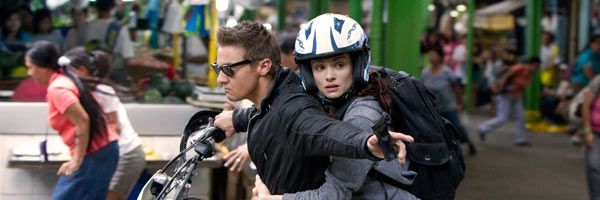Opening tomorrow is writer/director Tony Gilroy’s The Bourne Legacy. For those unfamiliar with the franchise reboot, this time around, a government task force led by Edward Norton‘s character is assassinating all their genetically-modified assets to prevent another Bourne situation. However, one member of the program, Aaron Cross (Jeremy Renner), manages to escape with a scientist (Rachel Weisz), and the two go on the run for their lives. The film also stars Oscar Isaac, Joan Allen, David Strathairn, Albert Finney, Stacy Keach, Scott Glenn, Corey Stoll, and Donna Murphy. For more on the film, here are five clips.During the recent Los Angeles press day, I did an exclusive interview with producer Patrick Crowley. If you're a fan of the Bourne films and want to hear some great behind the scenes stories about all four movies, you're in the right place. During our extended conversation we talked about the making of Bourne Legacy, did they ever consider 3D, Easter Eggs, test screenings, will future Bourne movies have Bourne in the title, coming up with new and exciting action scenes, deleted scenes, reshoots,  and so much more. Hit the jump for what he had to say.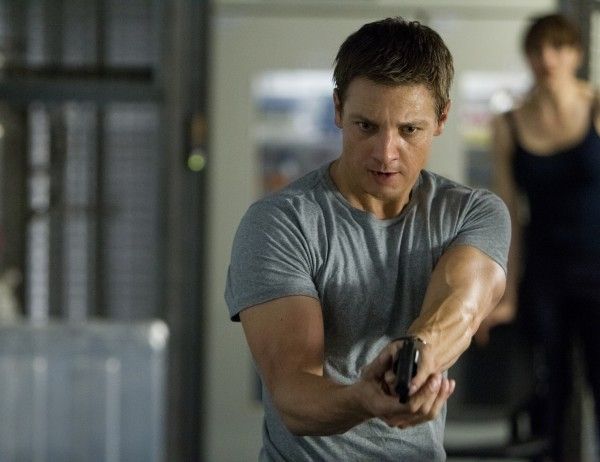 Question: Talk a little bit about getting involved in this project. This one’s been going through a lot of development.Pat Crowley: Well I've done all four of them, so I started the first one in 1999.How long ago were you guys developing this script?Crowley: Not this specific script, but the development process has been going on for at least four years.Did it start as soon as the third one was released or was it even before the third one came out?Crowley: It started after. We were never quite sure whether any one of the films was going to be successful or not. So there was always that period in which we'd pat ourselves on the back, and go, “I guess we did OK. I guess we better pull it together and do another one.†And there's always so many human elements involved in that, like the director Paul Greengrass wanted to do another movie before he did The Bourne Legacy, because he had done three movies in a row with Matt Damon. He had done The Green Zone, The Bourne Supremacy, and The Bourne Ultimatum. And he said, “I really need to do another movie without Matt, so people don’t think that I'm his director and people don’t think that he's my actor.†That process took a while to work itself out. Also, trying to come up with an idea that everybody thought was going to carry you through the fourth Bourne movie was a challenge.Clearly you guys are launching what is going to be a new version of the franchise, just in a different direction. Frank has said in previous interviews that the goal would be to get Matt and Jeremy in the same movie at some point. Do you think that is incredibly important, or do you think that if it doesn’t happen we still have enough with Jeremy that it’s not going to be an issue?Crowley: I think the direction we're going now with Jeremy as the lead person can stand on its own. We always wanted to make sure that if we went in a different direction that we could have the ability to bring Matt in later, so we never made any choices that eliminated the Jason Bourne character. We always wanted to keep that alive to see if things started to fall together whether they would at some point be in the same movie, but it’s not the goal. When we were making The Bourne Legacy we were not thinking about that, we were thinking about making the best movie that we could with Jeremy as the main character.
Question: Talk a little bit about getting involved in this project. This one’s been going through a lot of development.Pat Crowley: Well I've done all four of them, so I started the first one in 1999.How long ago were you guys developing this script?Crowley: Not this specific script, but the development process has been going on for at least four years.Did it start as soon as the third one was released or was it even before the third one came out?Crowley: It started after. We were never quite sure whether any one of the films was going to be successful or not. So there was always that period in which we'd pat ourselves on the back, and go, “I guess we did OK. I guess we better pull it together and do another one.†And there's always so many human elements involved in that, like the director Paul Greengrass wanted to do another movie before he did The Bourne Legacy, because he had done three movies in a row with Matt Damon. He had done The Green Zone, The Bourne Supremacy, and The Bourne Ultimatum. And he said, “I really need to do another movie without Matt, so people don’t think that I'm his director and people don’t think that he's my actor.†That process took a while to work itself out. Also, trying to come up with an idea that everybody thought was going to carry you through the fourth Bourne movie was a challenge.Clearly you guys are launching what is going to be a new version of the franchise, just in a different direction. Frank has said in previous interviews that the goal would be to get Matt and Jeremy in the same movie at some point. Do you think that is incredibly important, or do you think that if it doesn’t happen we still have enough with Jeremy that it’s not going to be an issue?Crowley: I think the direction we're going now with Jeremy as the lead person can stand on its own. We always wanted to make sure that if we went in a different direction that we could have the ability to bring Matt in later, so we never made any choices that eliminated the Jason Bourne character. We always wanted to keep that alive to see if things started to fall together whether they would at some point be in the same movie, but it’s not the goal. When we were making The Bourne Legacy we were not thinking about that, we were thinking about making the best movie that we could with Jeremy as the main character.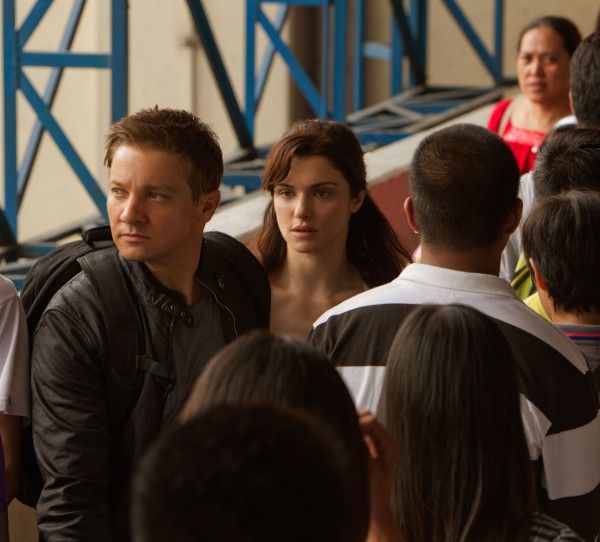 How cognizant during the decision making process that you might be setting it up for a trilogy, and maybe laying Easter eggs throughout this first film?Crowley: A lot of it is in Tony's mind, because Tony is, I think, the architect of the whole series to date. He was given the responsibility of – Ok now we need to go in a parallel direction, but we have to move forward. In my conversations with him he has worked out where it all has the possibilities of going, maybe not all the specifics. But Tony wanted to make sure that with the Ed Norton character with the NRAG (National Research Assay Group) that he had an entity that he could push and go out for at least three or four more of these. So it has always been a goal that if this is number four, then there would be a five, six, seven and it would continue. I've seen the movie, it’s really good. I'm sure audiences are really going to dig this thing. Has the studio already said to you guys assuming this is good, and assuming it’s a hit, lets aim for 2015, or has that discussion not been on the table?Crowley: It's never comes onto the table until the movie is released. So, it’s like the day after the movie's released?Crowley: The day after the movie's released there'll be a phone call, or there will be no phone call at all. But, the day after the movie is released there'll still be some kind of a phone call where they start taking a look at when they would want to have that movie to be in theaters. Then you work backwards from there and you figure the development process, the writing process, how long that's going to take. You start to check on people’s availabilities and then you set your production date.I'm a huge fan of IMAX, not IMAX 3D, just IMAX. Has there ever been a discussion about filming any sequence in IMAX and since you haven’t done it thus far do you think it could be something that would happen in future movies?Crowley: I think filming in IMAX would be something that we would inherently shy away from because so much of our stuff is shot in real locations in which you might have to be in a room that’s a third the size of this room and shoot for two days. And an IMAX camera is then a big obstacle. But for example, Robert who shot this also shot some IMAX stuff on MI4. I think if the technology supports it. But, I always thought this was a you're in the film kind of feeling as opposed to grand set pieces, and I don’t know that IMAX would necessarily be the next thing that we would think of.Â
How cognizant during the decision making process that you might be setting it up for a trilogy, and maybe laying Easter eggs throughout this first film?Crowley: A lot of it is in Tony's mind, because Tony is, I think, the architect of the whole series to date. He was given the responsibility of – Ok now we need to go in a parallel direction, but we have to move forward. In my conversations with him he has worked out where it all has the possibilities of going, maybe not all the specifics. But Tony wanted to make sure that with the Ed Norton character with the NRAG (National Research Assay Group) that he had an entity that he could push and go out for at least three or four more of these. So it has always been a goal that if this is number four, then there would be a five, six, seven and it would continue. I've seen the movie, it’s really good. I'm sure audiences are really going to dig this thing. Has the studio already said to you guys assuming this is good, and assuming it’s a hit, lets aim for 2015, or has that discussion not been on the table?Crowley: It's never comes onto the table until the movie is released. So, it’s like the day after the movie's released?Crowley: The day after the movie's released there'll be a phone call, or there will be no phone call at all. But, the day after the movie is released there'll still be some kind of a phone call where they start taking a look at when they would want to have that movie to be in theaters. Then you work backwards from there and you figure the development process, the writing process, how long that's going to take. You start to check on people’s availabilities and then you set your production date.I'm a huge fan of IMAX, not IMAX 3D, just IMAX. Has there ever been a discussion about filming any sequence in IMAX and since you haven’t done it thus far do you think it could be something that would happen in future movies?Crowley: I think filming in IMAX would be something that we would inherently shy away from because so much of our stuff is shot in real locations in which you might have to be in a room that’s a third the size of this room and shoot for two days. And an IMAX camera is then a big obstacle. But for example, Robert who shot this also shot some IMAX stuff on MI4. I think if the technology supports it. But, I always thought this was a you're in the film kind of feeling as opposed to grand set pieces, and I don’t know that IMAX would necessarily be the next thing that we would think of. 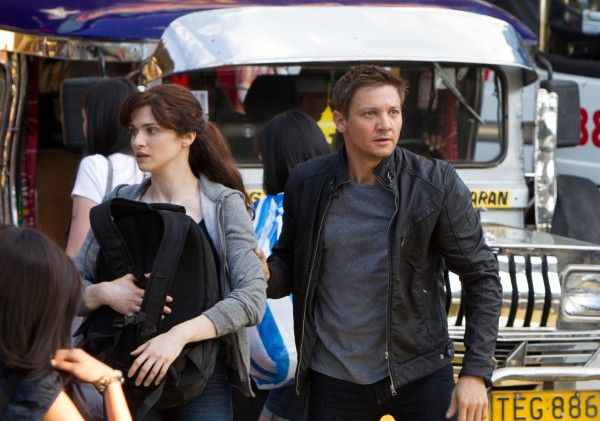 Ok. I could make the argument that IMAX is good for everything.Crowley: You know much more about it than I. I know that I like it when I see it. It just hasn't really come up, I don’t think it’s ever come up in any conversation we've had about the Bourne Series.Hopefully this conversation will lead to other people talking. What did you learn in the test screening process when you tested this movie?Crowley: One of the first things we learned is that it’s very important that the audience understand going in that Jeremy Renner is not playing Jason Bourne. Because people still, if you say to them, “Jeremy Renner is the lead, he's a new character, the Aaron Cross character.†They'll all go, “well, isn’t Matt Damon in the movie?†With the enormous amount of press that there has been about that, it still hasn't gotten through to the average viewer. So, we've seeded in some stuff of Matt, or things in which Jason Bourne was mentioned from Ultimatum. I think there were points at which the audience was sort of going, “well, you say that that's Jason Bourne and that's Matt Damon's picture, I thought that Jeremy Renner was Matt Damon.†It's still convincing people that it’s a parallel character.It’s interesting because I'm just so glued that I don't even think about it anymore.Crowley: You know, I talked to my mother in law and she goes, “Matt Damon isn’t in the movie?†and we’ve been talking about the movie for a year.Do you think that's kind of your own doing with the title being The Bourne Legacy?Crowley: I'm sure it has something to do with it. The other thing is the previous three Bourne movies have been about an unformed character and you watched him grown and determine who he was and what he'd done and where he was going to go. So people really knew Jason Bourne intimately. I think they'll make the transition, once they see the movie I don’t think it will be a problem, but for a lot of them, they're going, “Oh, great there’s another Bourne movie coming out!'
Ok. I could make the argument that IMAX is good for everything.Crowley: You know much more about it than I. I know that I like it when I see it. It just hasn't really come up, I don’t think it’s ever come up in any conversation we've had about the Bourne Series.Hopefully this conversation will lead to other people talking. What did you learn in the test screening process when you tested this movie?Crowley: One of the first things we learned is that it’s very important that the audience understand going in that Jeremy Renner is not playing Jason Bourne. Because people still, if you say to them, “Jeremy Renner is the lead, he's a new character, the Aaron Cross character.†They'll all go, “well, isn’t Matt Damon in the movie?†With the enormous amount of press that there has been about that, it still hasn't gotten through to the average viewer. So, we've seeded in some stuff of Matt, or things in which Jason Bourne was mentioned from Ultimatum. I think there were points at which the audience was sort of going, “well, you say that that's Jason Bourne and that's Matt Damon's picture, I thought that Jeremy Renner was Matt Damon.†It's still convincing people that it’s a parallel character.It’s interesting because I'm just so glued that I don't even think about it anymore.Crowley: You know, I talked to my mother in law and she goes, “Matt Damon isn’t in the movie?†and we’ve been talking about the movie for a year.Do you think that's kind of your own doing with the title being The Bourne Legacy?Crowley: I'm sure it has something to do with it. The other thing is the previous three Bourne movies have been about an unformed character and you watched him grown and determine who he was and what he'd done and where he was going to go. So people really knew Jason Bourne intimately. I think they'll make the transition, once they see the movie I don’t think it will be a problem, but for a lot of them, they're going, “Oh, great there’s another Bourne movie coming out!'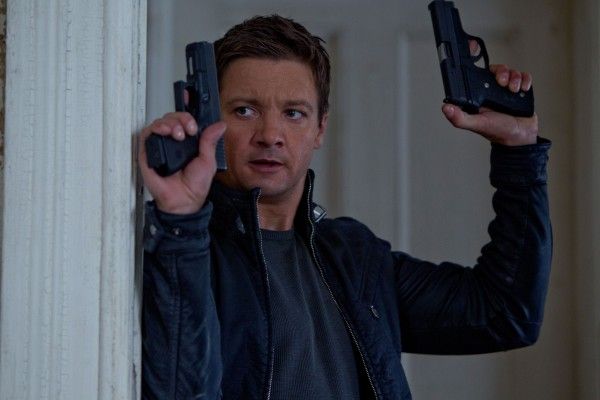 Do you think that a future sequel will have the name Bourne in the title?Crowley: I think that’s a really good question and I don’t know the answer because Ludlum only wrote three Bourne books anyway. Marketing may decide that it’s really important that they stay with that so people feel comfortable and go see the movie, but it is a really good question to ask. Because, if Jeremy Renner goes and takes off for another movie, its far less about Jason Bourne than it is about Aaron Cross. So it’s conceivable that it could get changed.Any film that has action in it, especially a Bourne movie, the action set pieces are a big part of it. That's what the audience wants to see, some kick-ass action. Talk about the challenge of always coming up with these new action set pieces, and was there something that you came up with for this film that you scrapped due to budget or because it was too complicated.Crowley: In lots of films, the action sequences are the first ones to get modified before you shoot them because it is where you're spending the most money. Dan Bradley, who is the second unit director and who was the second unit director on Ultimatum and Supremacy, and is a genius. He looked at the script and came in and talked to me, and said, “The motorcycle chase is going to be really hard.†He knows that he's got to up the ante anytime he does anything, and you've got to see the character. And Jeremy was not cast in the role. We knew that we were going to have to see this person’s face throughout this chase, and how to achieve that. Plus, it’s dangerous. When you say, “Jason Bourne's in that car over there and he just smashed into the wall and broke through and hit six police cars and flipped over four times,†there can be a stunt guy in there who's in an incredible roll cage, and he's completely protected. Or sometimes there’s no one in the car at all. With a motorcycle you can’t do that. It was Tony's idea, tony wanted a motorcycle chase. Tony had written that way. Then that became the task that we had to make work. And it was hard. There were times when you went we could get more bang for our buck if you didn't have him on the motorcycle. Part of the rooftop stuff there is to give us some time of him moving on the rooftop, so you're not on the motorcycle the whole time. But, that was what we felt was the best way to go. It’s very difficult for myself, and for all the other people who make action movies to keep coming up with stuff. Particularly when you're kind of rooting it in reality. Then it becomes really hard. You can't have a 3D character, a CG character who suddenly does something. We try to keep the feeling that this is something that actually happens for people.
Do you think that a future sequel will have the name Bourne in the title?Crowley: I think that’s a really good question and I don’t know the answer because Ludlum only wrote three Bourne books anyway. Marketing may decide that it’s really important that they stay with that so people feel comfortable and go see the movie, but it is a really good question to ask. Because, if Jeremy Renner goes and takes off for another movie, its far less about Jason Bourne than it is about Aaron Cross. So it’s conceivable that it could get changed.Any film that has action in it, especially a Bourne movie, the action set pieces are a big part of it. That's what the audience wants to see, some kick-ass action. Talk about the challenge of always coming up with these new action set pieces, and was there something that you came up with for this film that you scrapped due to budget or because it was too complicated.Crowley: In lots of films, the action sequences are the first ones to get modified before you shoot them because it is where you're spending the most money. Dan Bradley, who is the second unit director and who was the second unit director on Ultimatum and Supremacy, and is a genius. He looked at the script and came in and talked to me, and said, “The motorcycle chase is going to be really hard.†He knows that he's got to up the ante anytime he does anything, and you've got to see the character. And Jeremy was not cast in the role. We knew that we were going to have to see this person’s face throughout this chase, and how to achieve that. Plus, it’s dangerous. When you say, “Jason Bourne's in that car over there and he just smashed into the wall and broke through and hit six police cars and flipped over four times,†there can be a stunt guy in there who's in an incredible roll cage, and he's completely protected. Or sometimes there’s no one in the car at all. With a motorcycle you can’t do that. It was Tony's idea, tony wanted a motorcycle chase. Tony had written that way. Then that became the task that we had to make work. And it was hard. There were times when you went we could get more bang for our buck if you didn't have him on the motorcycle. Part of the rooftop stuff there is to give us some time of him moving on the rooftop, so you're not on the motorcycle the whole time. But, that was what we felt was the best way to go. It’s very difficult for myself, and for all the other people who make action movies to keep coming up with stuff. Particularly when you're kind of rooting it in reality. Then it becomes really hard. You can't have a 3D character, a CG character who suddenly does something. We try to keep the feeling that this is something that actually happens for people.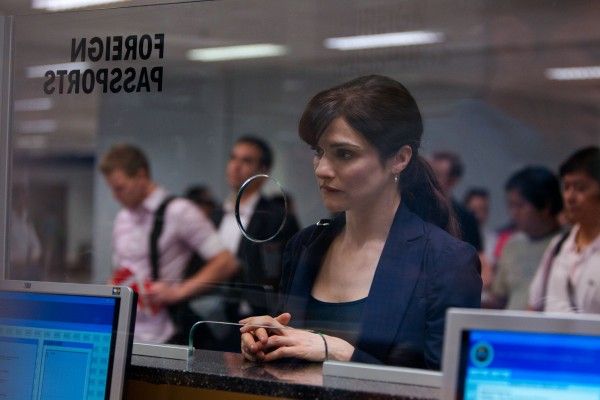 What is bubbling up for you in terms of other projects, or have you just been too knee deep in Bourne?Crowley: Pretty much, right now, this Bourne was sixteen months and I was out of town for over a year so, so I think I'm just laying low for a while.Until Saturday opening weekend.Crowley: Until Saturday opening weekend. And all bets are off. And you'd be amazed by the phone calls that you get that come from places that you never expected them to come from.If I'm not mistaken you were originally pitted against Total Recall and then you bumped back a week to the 10th. Was that a result of Recall, or was that a result of getting away from The Dark Knight Rises a little bit?Crowley: It was much more about Dark Knight, because Dark Knight was just sweeping everything in its path, it was a tsunami. We'd always been in the first week of August, and it’s a great time to release, because you pick up people before they start to go back to school. We all felt, and the studio is pretty good at being able to model this stuff and see what was likely to happen. You need to open well. People like to see movies that do open big and open well. Even if it decreases the longevity in terms of the amount of the opportune time that you have to release the movie. It made much more sense to open well.In terms of deleted scenes, did you have a lot?Crowley: No. We had one scene with Jeremy and a state trooper, where he's on his way to Chicago on his way to Marta's house. It was a long, really good dialogue scene in which the state trooper sort of thinks something’s funny and see what an incredible job Aaron Cross has done of disguising himself. And he comes up with a perfect alibi for what he's doing. The state trooper just pulled him over.
What is bubbling up for you in terms of other projects, or have you just been too knee deep in Bourne?Crowley: Pretty much, right now, this Bourne was sixteen months and I was out of town for over a year so, so I think I'm just laying low for a while.Until Saturday opening weekend.Crowley: Until Saturday opening weekend. And all bets are off. And you'd be amazed by the phone calls that you get that come from places that you never expected them to come from.If I'm not mistaken you were originally pitted against Total Recall and then you bumped back a week to the 10th. Was that a result of Recall, or was that a result of getting away from The Dark Knight Rises a little bit?Crowley: It was much more about Dark Knight, because Dark Knight was just sweeping everything in its path, it was a tsunami. We'd always been in the first week of August, and it’s a great time to release, because you pick up people before they start to go back to school. We all felt, and the studio is pretty good at being able to model this stuff and see what was likely to happen. You need to open well. People like to see movies that do open big and open well. Even if it decreases the longevity in terms of the amount of the opportune time that you have to release the movie. It made much more sense to open well.In terms of deleted scenes, did you have a lot?Crowley: No. We had one scene with Jeremy and a state trooper, where he's on his way to Chicago on his way to Marta's house. It was a long, really good dialogue scene in which the state trooper sort of thinks something’s funny and see what an incredible job Aaron Cross has done of disguising himself. And he comes up with a perfect alibi for what he's doing. The state trooper just pulled him over.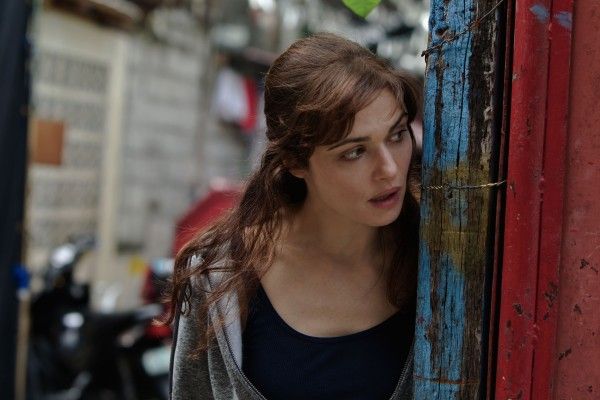 This must be after the scene where he's telling Rachel to practice who they are.Crowley: No, this is before he gets to the house. It's before the shoot out. He's found his car in the garage, pulled the panels off the door. Then he goes and you see him driving off; he's in Chicago. Then the next time you see him he's changing his boots and he's in a wooded area, and he's about to go to Rachel's rescue. This was a scene in between, which was pretty much just a character scene; it wasn't really a plot scene. In which there's a state trooper who pulls him over because there's something he doesn't like about him. It was this great really tense scene, this exchange of questions back and forth, and you see how glib and how seductive Aaron Cross can be if he needs to verbally disarm somebody. And the state trooper eventually believed him, let him go and moved on. It was about a three or four minute scene. Audiences were going, “We want to get to the house sequence.†Because, the house sequence is also the place at which they really feel the kind of action that they're coming to the theater for.So, I'm assuming there are more deleted scenes than just this? Or was this the major one?Crowley: Not much. Then you get into lots of trims. You've got Aaron Cross is the A story, then you've got Edward Norton and his people as the B story and there might be little things of the B story. You always cut back to that, just in order to keep the pace up and give additional information about the story. There might be tiny ten fifteen second thing that was cut out, but not much else.Edward Norton - I love his work, great actor, a lot of talk about Edward Norton being in the editing room always being involved, or helping out if you will. How was he in this movie? Was he in the editing room at all, or did he just do the performance?Crowley: Just did the performance.Had you heard about this?Crowley: Well, sure. He has a well deserved reputation, so naturally expectations are very high on the first day when he comes to work. Because you don't know. You don't know how mercurial he's going to be, or anything. And he and Tony, they had talked a lot before hand, but he and Tony completely clicked. I was relieved and also really, really impressed with how comfortable Tony was. He could answer any question that Edward had for him. If he felt Edward was going a little bit, he would guide him back gently. If Edward would ask, “Why are we going here and doing this?†Tony had an answer for him. Tony was very effective. Nothing could have made me happier.
This must be after the scene where he's telling Rachel to practice who they are.Crowley: No, this is before he gets to the house. It's before the shoot out. He's found his car in the garage, pulled the panels off the door. Then he goes and you see him driving off; he's in Chicago. Then the next time you see him he's changing his boots and he's in a wooded area, and he's about to go to Rachel's rescue. This was a scene in between, which was pretty much just a character scene; it wasn't really a plot scene. In which there's a state trooper who pulls him over because there's something he doesn't like about him. It was this great really tense scene, this exchange of questions back and forth, and you see how glib and how seductive Aaron Cross can be if he needs to verbally disarm somebody. And the state trooper eventually believed him, let him go and moved on. It was about a three or four minute scene. Audiences were going, “We want to get to the house sequence.†Because, the house sequence is also the place at which they really feel the kind of action that they're coming to the theater for.So, I'm assuming there are more deleted scenes than just this? Or was this the major one?Crowley: Not much. Then you get into lots of trims. You've got Aaron Cross is the A story, then you've got Edward Norton and his people as the B story and there might be little things of the B story. You always cut back to that, just in order to keep the pace up and give additional information about the story. There might be tiny ten fifteen second thing that was cut out, but not much else.Edward Norton - I love his work, great actor, a lot of talk about Edward Norton being in the editing room always being involved, or helping out if you will. How was he in this movie? Was he in the editing room at all, or did he just do the performance?Crowley: Just did the performance.Had you heard about this?Crowley: Well, sure. He has a well deserved reputation, so naturally expectations are very high on the first day when he comes to work. Because you don't know. You don't know how mercurial he's going to be, or anything. And he and Tony, they had talked a lot before hand, but he and Tony completely clicked. I was relieved and also really, really impressed with how comfortable Tony was. He could answer any question that Edward had for him. If he felt Edward was going a little bit, he would guide him back gently. If Edward would ask, “Why are we going here and doing this?†Tony had an answer for him. Tony was very effective. Nothing could have made me happier.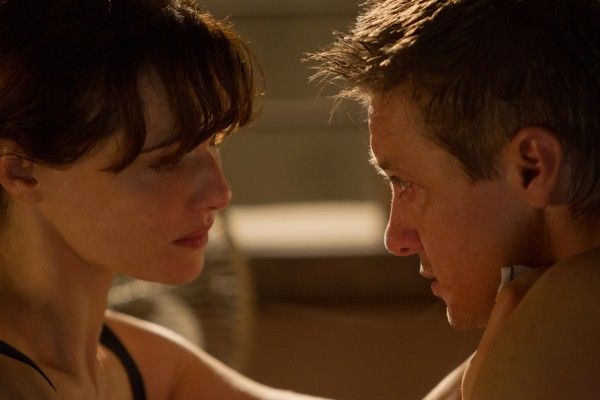 I would imagine that having a strong director with a strong vision, knowing exactly what they want would ease many situations.Crowley: Many, many. All the good directors I've ever worked with were people who knew that actors want their help and their guidance. And they knew the project so well, particularly for an actor who really gets involved in it, that they can say “this is where your character is right now, and I know because I've crafted it that way.†Then the actor kind of surrenders and lets themselves go with the director and I think that's always when you get the best performance.Every movie has re-shoots. Did you guys do a lot, did you do just pickups?Crowley: We had thirty-five days of shooting in the Philippines. Seventeen days of that was first unit and eighteen days of it was second unit. That was supposed to be, that time of year - which was January, February, March is supposed to be the best weather that you're going to get in the Philippines. Because right now, its monsoons. It was monsoons right before we got there. People were going, “are you sure this is when we're supposed to be here? It’s been raining day after day after day.†I was on the phone to all these weather men, “What's happening? Are we in trouble here?†Because everything took place in the same day, so you couldn't go from a scene in which its bright sunlight then it’s raining cats and dogs. Out of those thirty-five days we made it through about twenty-eight days. Then we got hit with rain. We got hit with rain and a big highway which is called Magsaysay Boulevard in Manila near the president’s palace, we had closed down lanes, traffic was backed up for hours. It was a huge deal. We were shooting on Saturday, Sunday and then we got rained out. Then we had to wait for another Saturday, Sunday in order to get there and we didn't get all the work, there were some pieces that were left over. Those are the pieces that we had to come back to a parking lot in LA and basically just shoot up against green screen a car crashing into a wall. Just little tiny bits and pieces in order to make the action work. And that's a first; usually the Bourne movies have had a great deal more reshooting.Â
I would imagine that having a strong director with a strong vision, knowing exactly what they want would ease many situations.Crowley: Many, many. All the good directors I've ever worked with were people who knew that actors want their help and their guidance. And they knew the project so well, particularly for an actor who really gets involved in it, that they can say “this is where your character is right now, and I know because I've crafted it that way.†Then the actor kind of surrenders and lets themselves go with the director and I think that's always when you get the best performance.Every movie has re-shoots. Did you guys do a lot, did you do just pickups?Crowley: We had thirty-five days of shooting in the Philippines. Seventeen days of that was first unit and eighteen days of it was second unit. That was supposed to be, that time of year - which was January, February, March is supposed to be the best weather that you're going to get in the Philippines. Because right now, its monsoons. It was monsoons right before we got there. People were going, “are you sure this is when we're supposed to be here? It’s been raining day after day after day.†I was on the phone to all these weather men, “What's happening? Are we in trouble here?†Because everything took place in the same day, so you couldn't go from a scene in which its bright sunlight then it’s raining cats and dogs. Out of those thirty-five days we made it through about twenty-eight days. Then we got hit with rain. We got hit with rain and a big highway which is called Magsaysay Boulevard in Manila near the president’s palace, we had closed down lanes, traffic was backed up for hours. It was a huge deal. We were shooting on Saturday, Sunday and then we got rained out. Then we had to wait for another Saturday, Sunday in order to get there and we didn't get all the work, there were some pieces that were left over. Those are the pieces that we had to come back to a parking lot in LA and basically just shoot up against green screen a car crashing into a wall. Just little tiny bits and pieces in order to make the action work. And that's a first; usually the Bourne movies have had a great deal more reshooting. 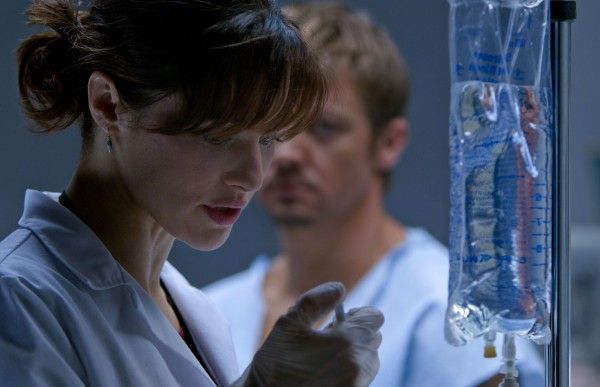 Was Manila always in the script? Or was that added as a cool country that you hadn't been to?Crowley: What we've done in the past is, Tony sits down and thinks of a city that either has some mystery to it or kind of an unknown city, which makes it mysterious in itself. So we went to Moscow, Tony and I went to Moscow with Frank and we figured out how the third act was going to go for Supremacy. Tony and I went to Tangiers and figured out how the big action sequence in Morocco was going to work. On this one Tony and I went to Jakarta, Manila, and Ho Chi Minh City, formerly Saigon, to look at those three because we wanted to go to Asia for the first time, because we hadn’t been there before. Tony thought in terms of the pharmaceutical aspect of it, that made sense that you had the manufacturer of your stuff in a distant location. We went and we spent three days in each country. We were looking for a fish market; we were looking for an intense urban area, not a slum, but just a very poor area. When we came back, that's the point at which all three of those options were up in the air for a couple months. Then it was my responsibility to figure out which was the most productive place to go. Manila was the one that passed the test because it had a long history of making movies. Jumping back into the previous Bourne movies. I remember on the second or third movie, there was a press junket and everyone involved with the film was incredibly nervous because it was the first time anybody had seen the film. It had literally just been finished. Then everybody saw it and it was awesome. You could see a sense of relief on everybody's face. Talk about the stress of making a film like that, that's so last minute versus this movie where you had a script the whole way through.
Was Manila always in the script? Or was that added as a cool country that you hadn't been to?Crowley: What we've done in the past is, Tony sits down and thinks of a city that either has some mystery to it or kind of an unknown city, which makes it mysterious in itself. So we went to Moscow, Tony and I went to Moscow with Frank and we figured out how the third act was going to go for Supremacy. Tony and I went to Tangiers and figured out how the big action sequence in Morocco was going to work. On this one Tony and I went to Jakarta, Manila, and Ho Chi Minh City, formerly Saigon, to look at those three because we wanted to go to Asia for the first time, because we hadn’t been there before. Tony thought in terms of the pharmaceutical aspect of it, that made sense that you had the manufacturer of your stuff in a distant location. We went and we spent three days in each country. We were looking for a fish market; we were looking for an intense urban area, not a slum, but just a very poor area. When we came back, that's the point at which all three of those options were up in the air for a couple months. Then it was my responsibility to figure out which was the most productive place to go. Manila was the one that passed the test because it had a long history of making movies. Jumping back into the previous Bourne movies. I remember on the second or third movie, there was a press junket and everyone involved with the film was incredibly nervous because it was the first time anybody had seen the film. It had literally just been finished. Then everybody saw it and it was awesome. You could see a sense of relief on everybody's face. Talk about the stress of making a film like that, that's so last minute versus this movie where you had a script the whole way through. Crowley: The two movies to compare for that would be The Bourne Ultimatum and The Bourne Legacy. On The Bourne Ultimatum we had an eighty day schedule and we came in at a hundred and twenty days. I've been doing this a long time and I'm almost always on schedule. The first people to see the film complete were at the publicity screening. Someone from universal publicity was on the phone going, “the line where Matt Damon says 'if you were in your office we'd be having this conversation face to face,' they love it! They love it!†So we were all in the editing room, completely tense, we could hear applause, or if there was some comment. That was the first time anyone had seen the film done together. That was cutting it pretty close. The first one was fifty-five weeks in post production, The Bourne Identity. The second one we only had sixteen weeks of post, so it was absolutely rushed. On this movie Tony's brother John is the editor, and they were pretty much cut-to-camera all the time. So that Tony could go and look at stuff he had shot two to three days before and really get a sense of how the movie was fitting together. There's a meticulous quality to this, just in terms of the music, the effects and everything else. We've got some great stuff before, but I think there's some really quality, solid stuff here. Because everybody knew what the movie was going to look like. At the end of The Bourne Ultimatum when Jason Bourne jumps into the Hudson River and goes down, floats down into the water, and then starts to swim, we also had a version where he just floats down and didn't ever swim. Those were last minute decisions.I'm curious what it’s like being a producer when its forty days over schedule. What kind of messages are you getting from Universal at that point? What's it like to call the studio and tell them you're going to be really over on this one?Crowley: One, it depends on how successful previous iterations of the movie had been. So if you're in the third movie and they did really well on the first one, they did very, very well with the second one, they cut you a lot of slack. But it gets to a certain point. This was not good. We need to spend this money we want it to look cooler. Or we need to spend this money because we shot these scenes and they don’t really work, and so now we need to shoot these scenes because we think they're going to work. It was that free form of an experience. Which is crazy because every other movie that's made in that way generally does not work. It’s usually a disaster, and that movie is really good.Crowley: A lot of the credit on that goes to Chris Rouse, who was the editor on the second and third one. He could put stuff together in ways where you were just entranced by what he did. There might be a logic hole big enough to drive four trucks through, but you just went “Wow! The pace is great and how did it get from this to this, and this is so exciting!†and suddenly you're in another country. We got really, really, really lucky.
Crowley: The two movies to compare for that would be The Bourne Ultimatum and The Bourne Legacy. On The Bourne Ultimatum we had an eighty day schedule and we came in at a hundred and twenty days. I've been doing this a long time and I'm almost always on schedule. The first people to see the film complete were at the publicity screening. Someone from universal publicity was on the phone going, “the line where Matt Damon says 'if you were in your office we'd be having this conversation face to face,' they love it! They love it!†So we were all in the editing room, completely tense, we could hear applause, or if there was some comment. That was the first time anyone had seen the film done together. That was cutting it pretty close. The first one was fifty-five weeks in post production, The Bourne Identity. The second one we only had sixteen weeks of post, so it was absolutely rushed. On this movie Tony's brother John is the editor, and they were pretty much cut-to-camera all the time. So that Tony could go and look at stuff he had shot two to three days before and really get a sense of how the movie was fitting together. There's a meticulous quality to this, just in terms of the music, the effects and everything else. We've got some great stuff before, but I think there's some really quality, solid stuff here. Because everybody knew what the movie was going to look like. At the end of The Bourne Ultimatum when Jason Bourne jumps into the Hudson River and goes down, floats down into the water, and then starts to swim, we also had a version where he just floats down and didn't ever swim. Those were last minute decisions.I'm curious what it’s like being a producer when its forty days over schedule. What kind of messages are you getting from Universal at that point? What's it like to call the studio and tell them you're going to be really over on this one?Crowley: One, it depends on how successful previous iterations of the movie had been. So if you're in the third movie and they did really well on the first one, they did very, very well with the second one, they cut you a lot of slack. But it gets to a certain point. This was not good. We need to spend this money we want it to look cooler. Or we need to spend this money because we shot these scenes and they don’t really work, and so now we need to shoot these scenes because we think they're going to work. It was that free form of an experience. Which is crazy because every other movie that's made in that way generally does not work. It’s usually a disaster, and that movie is really good.Crowley: A lot of the credit on that goes to Chris Rouse, who was the editor on the second and third one. He could put stuff together in ways where you were just entranced by what he did. There might be a logic hole big enough to drive four trucks through, but you just went “Wow! The pace is great and how did it get from this to this, and this is so exciting!†and suddenly you're in another country. We got really, really, really lucky.

